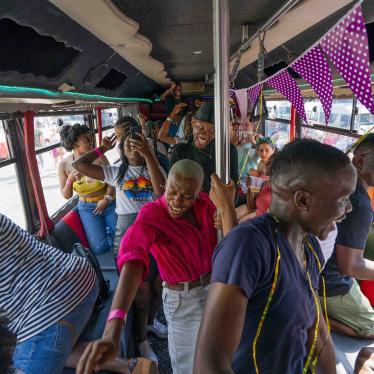Russia must seek the return from Uzbekistan of an Uzbek asylum seeker who was deported from Russia after the European Court of Human Rights issued an order to stop his deportation, Human Rights Watch said today.
Russian authorities deported the man, Rustam Muminov, on October 24 at 7:20 p.m. Moscow time, 20 minutes after the European Court of Human Rights (ECHR) had issued an injunction to stop the deportation.
Muminov was detained on October 17 at the Moscow office of Civic Assistance, a migrants’ rights organization. He is wanted in Uzbekistan on charges of membership in Hizb ut-Tahrir, an Islamic organization that is banned in Uzbekistan.
“Our greatest concern is for Muminov’s protection from torture or other ill-treatment,” said Holly Cartner, Europe and Central director at Human Rights Watch. “Russia must take immediate steps to reverse its action of placing Muminov in harm’s way.”
Torture in police and security services detention in Uzbekistan is routine and well-documented, particularly against those accused of membership in Hizb ut-Tahrir and other religious organizations the government considers to be “fundamentalist.”
The ECHR can issue injunctions, called interim measures, to urgently stop action by a state that would cause irreparable harm to the plaintiff. They are most commonly used to stop deportations, extraditions and other kinds of removals. According to Civic Assistance, the court notified Russia’s representative to the Council of Europe of the interim measures by fax at 5:00 p.m. CET, or 7:00 p.m. Moscow time. It is not known as of this writing what steps, if any, were taken to comply with the order.
“The very fact that the European Court urgently issued an interim measure in Muminov’s case indicates just how serious his claim to harm is,” said Cartner. “It’s astounding that Russian authorities could have permitted this deportation to go forward. The Council of Europe and the EU must raise this issue immediately with Russia’s leadership.”
Russia currently holds the chairmanship of the Committee of Ministers of the Council of Europe, Europe’s foremost human rights body. Russia will meet with the European Union for human rights consultations in early November, followed by a Russia-EU summit later in the month.
On October 5, Muminov filed an application for refugee status with the Moscow office of the United Nations High Commissioner for Refugees (UNHCR). On October 17, a Moscow court ordered his deportation for lack of the temporary residence permit that is obligatory for all visitors to Moscow. Under Russian law, a deportation order enters into force only after an appeal has been completed. Muminov’s appeal on the deportation order was scheduled to be heard on October 26.
In addition, the European Convention on Human Rights, by which Russia is legally bound, strictly prohibits the deportation of any person – no matter what their crime or suspected activity – to a country where he or she faces a real risk of torture or cruel, inhuman or degrading treatment or punishment.
The UN Convention Against Torture, to which Russia is also a party, imposes a similar prohibition on Russia. In 2003, the UN Special Rapporteur on Torture, Theo van Boven, found torture in Uzbekistan to be “systematic.”
In February, Muminov was detained in Lipetsk province, about 500 kilometers southeast of Moscow, following an Uzbek extradition request. At the end of September, Russia’s prosecutor general declined the extradition request, and Muminov was released on September 29. That same day, the local prosecutor’s office sought unsuccessfully to have Muminov deported for lack of a residence permit, despite the fact that he had been in custody for the previous seven months.
Muminov subsequently applied for a residence permit, but was declined by local police officials. He then went to Moscow in order to seek UNHCR protection. He was scheduled to be interviewed by the UNHCR on November 1.
As a party to the Refugee Convention of 1951 and its 1967 Protocol, Russia has an obligation not to return people who would face threats to their lives or freedom upon return.
In August, the ECHR imposed interim measures prohibiting the extradition of 13 Uzbeks from Ivanovo, recognized by UNHCR as mandate refugees in need of international protection. The Uzbek government has accused the men of links to the Andijan events of May 2005. The men have been in detention in Russia since June 2005.
“This sets a dangerous precedent for all asylum seekers in Russia,” Cartner said. “The European Union and Russia’s other international partners should demand assurances that Moscow will comply with its commitments not to send refugees or asylum seekers back to countries where they face harm.”






